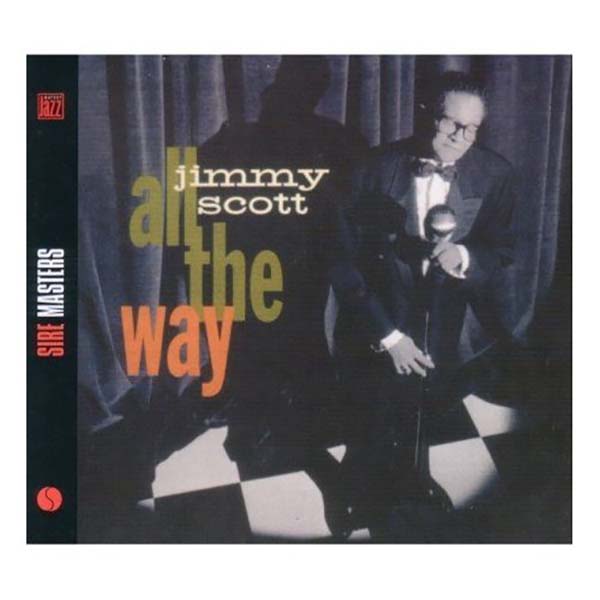
by Ian Mann
March 12, 2007
/ ALBUM
A unique voice. Sophisticated arrangements. A classic ballad album from "The Male Billie Holiday.
I must confess that the name of veteran singer Jimmy Scott is one that has managed to pass me by until now. Now in his eighties Scott first came to prominence with Lionel Hampton’s band in 1948 performing on the hit ballad “Everybody’s Somebody’s Fool”. Scott subsequently sat in with Charlie Parker and also embarked on a solo career first with the Roost and Coral labels and later with Savoy.
Ray Charles then signed Scott for his own Tangerine label and produced the album “Falling In Love Is Wonderful”. However Savoy maintained that Scott was still contracted to them and his album was pulled from the shelves only three weeks after it’s release. The long and bitter lawsuit that ensued effectively scuppered Scott’s career.
He later recorded the album “Source” for Atlantic in 1969 and the aptly titled “Can’t We Begin Again” for Savoy in 1975 before dropping off the radar altogether in the 1980’s. During this period Scott returned to his native Cleveland and worked as a hotel shipping clerk and as a lift operator.
It was when he sang at the funeral of the songwriter Doc Pomus in 1991 that he was heard by Sire records boss Seymour Stein. The following year Scott recorded the album “All The Way” for the Sire label which was released to great acclaim and brought Scott back into the limelight albeit rather late in life. Scott became something of a cult figure in the 90’s and has been name checked by fellow performers as diverse as Quincy Jones, Lou Reed, Liza Minnelli, Madonna, Van Morrison, Nick Cave, Bruce Springsteen and Antony Hegarty.
His distinctive tones have also been heard on a number of movie soundtracks including “Albino Alligator”, “A Rage In Harlem” and “Glengarry Glen Ross”.
Scott’s singing on “All The Way” is remarkable. He was born with Kallman’s Syndrome, a hormone disorder that prevents adolescent growth. As a result Scott was of diminutive stature and as a result was at one time billed as “Little Jimmy Scott”. His condition also accounted for his distinctive, high-pitched voice.
The music on “All The Way” is composed entirely of ballad material drawn from the Great American Songbook. Scott’s voice is unique, sounding almost feminine. He sings with a profound sense of involvement, caressing the lyric. At times he sounds unbearably sad and you can hear the disappointments of a long and sometimes difficult life in his voice.
He is surrounded by an all-star band with Kenny Barron at the piano, the great Ron Carter on bass and Grady Tate on drums. These three make a superb unit and offer the singer empathic support. Tate is the epitome of restraint with his delicate brushwork , Barron’s touch is light and assured throughout and Carter is a model of dependability.
Each of the ten tracks has a lush but tasteful arrangement by the likes of Johnny Mandel, Dale Oehler and John Clayton with strings being used judiciously. Guitarist John Pisano and saxophonist David “Fathead” Newman enliven some numbers with Newman’s smoky after hours solo on “At Last” a particular highlight. Barron also takes the occasional solo as on “I’m Getting Sentimental Over You” but the album is not really about soloing, it’s about building an atmosphere and bringing out the best in Scott’s amazing voice. He lingers over phrases and wrings every last drop of emotion out of the compositions and the arrangements are in complete sympathy with this aesthetic. Producer Tommy Lipuma deserves credit here too.
The standard of the album is so consistently high that it seems invidious to pick out highlights. However “Someone to Watch Over Me” is particularly noteworthy as this was the song Scott performed at Pomus’ funeral and was thus the start of the whole project. The closing “Street Of Dreams” is a bonus track not available on the original album.
When the album was released in 1992 it was an instant classic gaining a five star review in Downbeat magazine and a Grammy nomination.
It is certainly a remarkable piece of work. Scott’s voice is initially somewhat unnerving but repeated listening reveals just how unique a singer he is and how skilled is his delivery. There is an aching sadness about his voice too, he sounds bruised and vulnerable. If there is such a thing as a “male Billie Holiday” it must surely be Jimmy Scott.
However, Scott’s voice is so distinctive that it may not appeal to all listeners and I’m sure some people will actively dislike it. Classic cult figure formula I would say. If you like Jimmy Scott you will love this re-release and if you’ve not heard him before, well try to hear something and make up your own minds. The lushness and sophistication of the arrangements will hopefully ensure that the album gets some radio exposure.
I’ve still not made up my own mind as to how much I actually like this record - but it is certainly unique, and undoubtedly very skilful and classy.
blog comments powered by Disqus